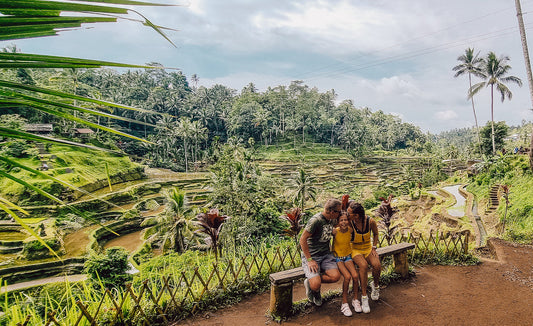Do you want your kids to be happy and smart?
Do you think you can achieve both goals by giving them educational toys? A lot of toys? They ask for them, so why not answer their wishes?
Remember that quote: “Be careful what you wish for because you might get it”? This quote easily applies to kids who ask constantly for new toys, new games, new things… when in fact, deep down inside, they want something else. We all know it: they want to spend time with their parents. Plain and simple.
That brings me to the first scientific proof why family vacations make our kids happier and smarter.
Buying experiences make us happier than buying things
|
According to Psychology Professor Thomas Gilovich, “when it comes to spending disposable income, experiential purchases tend to make people happier than material purchases. But why are experiences more satisfying? (…) Our results suggest that experiential purchase decisions are (…) more conducive to well-being.”
What does it mean? Is it the same with gifts? Because when we receive a gift, we are not spending money. Someone else is.
Is it true? Because when I am getting a new toy for my little girl, or I buy something I want for myself, we really feel joyful! And if the scientific proofs mentioned above are true, what kind of experience would be the best gift to give to ourselves and to our kids? Are family vacations the best present to give to our kids?
Yes, kids are no different than adults, and regard experiences like travel as far more fulfilling than getting their hands on a brand new toy. The only difference is that they value different aspects of that travel experience. We can conclude with these 4 scientific proofs that family vacations really make us happier. But are there other benefits to family vacations, especially for kids? Family vacations deepens and strengthens bonds
On family vacations, parents aren’t focused on work and chores, but on play. “Dad or Mum, building sandcastles, playing badminton on the beach, jumping over waves. It seems like fun, but it’s also “attachment play”, and it’s vital for bonding. Attachment play also enhances self-esteem, sending a child the psychological message: “You have my full attention. I delight in you. I delight in being with you.” What else? Is it true family vacations can make our kids smarter? Family vacations make our kids smarterDr. Sunderland continues her analysis of family vacations, and she concludes this: “What is less widely known is that This is because on a family holiday you are exercising two genetically ingrained systems deep in the brain’s limbic area, which can all too easily be “unexercised” in the home. These are the PLAY system and the SEEKING system.”
She explains that “the brain’s PLAY system is exercised every time you bury your child’s feet in the sand, tickle them on the pool lounger, or take them for a ride on your back. The brain’s SEEKING system is exercised each time you go exploring together: the forest, the beach, a hidden gem of a village.”
How does it work? Once your family vacations adventures and experiences activate these two systems in your own brain, and in your kids’ brains, “they trigger well-being neurochemicals including opioids, oxytocin, and dopamine.” Panksepp calls them “nature’s gift to us”. “They reduce stress and activate warm, generous feelings towards each other and a lovely sense that all is well in the world. With all the anti-stress aspects of these systems firing,
The most amazing thing is that these systems are like muscles: the more you use them, the more they become part of your personality.
And that kind of personality traits will translate into the ability to play with ideas, essential, for example, to a successful entrepreneur. Dr Sunderland adds that “really using the brain’s PLAY and SEEKING systems well, as often happens on family Moreover, since most family vacation activities happen to take place outside, the kids’ concentration skills are strengthened.
Research has revealed improvements in a child’s concentration levels and attention after being in nature for only 20 minutes. As explained by Dr. Sunderland: Is there a relationship between family vacations and IQ?As Dr. Sunderland says, “enriched environments turn on the genetic expression of key “brain fertilizers” in the frontal lobes, enhancing executive functions such as stress regulation, attention, concentration, good planning and ability to learn, also improving physical and mental health. The brain fertilizers triggered in enriched environments are also associated with higher IQ in children.“ What are “enriched environments”? An enriched environment offers new social, physical, sensory interaction and learning experiences for kids, and adults too. Think: family together walking in a tropical forest, playing together in the pool or running in the waves.
Now let’s take this up a notch. Raising our kids to become successful world-class citizens through family vacations
“When children can empathize with and take responsibility for others, they’re likely to be happier and more successful. They’ll have better relationships their entire lives, and strong relationships are a key ingredient of happiness. In today’s workplace, success often depends on collaborating effectively with others, and children who are empathic and socially aware are also better collaborators.” How does this science relate to travel and family vacations?
Then the kids feel loved and become even more attached to their parents, and that attachment makes them more receptive to their parents’ values and teaching. As we saw above with Dr. Sunderland’s studies, family vacations are one of the best opportunity to give the prized gift of quality time to our precious kids. It will help them improve their perspective and solving skills. And there’s nothing easier for kids to be grateful and thankful for when they feel considered and when they spent a lot of fun and quality time with their parents. Especially in our more global world, it’s important for kids to develop concern for people who live in other cultures and communities around the world.
And of course, traveling around the world and going on family vacations stimulate our kids’ curiosity and creativity, help develop his self-esteem and help him adapt more easily. But you might ask: in what enriched environment will my kids enjoy, learn and thrive the best? What kind of family vacations is best for kids?Yes, not all family vacations are created equal. Here are the 5 keys to successful and happy family vacations. The best attitude for happy family vacationsAccording to Oliver James, “the first and simplest mistake that an awful lot of parents make is confusing what they find exciting about a holiday with what their children will. So many of the ‘interesting’ things about a new place are deathly boring to the vast majority of children — high culture, for example, in almost all forms. So your child, if at all typical, will grumble at the ghastly business of being dragged round.” “Give a two-year-old a present and she’ll get absorbed in the box instead,” says James. “It’s similar with children and travel. We should let them explore their own ways of finding wonder in their surroundings.”
It means that kids see the world differently and that some details you won’t even notice will on the other hand stick with them long after the family vacation ends. What our kids value, what they will remember long after the family vacations, is the family moments spent together: talking nonsense, singing a song, sharing an ice cream, burying daddy in the sand. Family vacations preparationPreparation is also very important to make family vacations a stunning success. Vacation anticipation, for example, is key to happy family vacations.
How to increase pre-trip happiness? By building anticipation: counting the days before departure, booking several short vacations instead of going on one long family vacation and reading about our destinations are the best ways to increase pre-trip happiness. Moreover, the Harvard study mentioned above concluded that involving children in organizing family vacations teaches solving skills and gives them an authentic responsibility: becoming co-creators of a happy family. So getting your kids involved in the preparation of your family vacations will make them smarter and happier. The best destinations for family vacationsAnother way we can make the most of our family vacations is to spend most of our travel days outside.
There is also evidence that a walk together in green space calms the body, lowering blood pressure and stress hormone levels and even cholesterol — so everyone can benefit from it. The best activities for family vacations
How to create the best memories of family vacationsWant to enhance your family’s positive feelings towards your vacation for a long period of time, even after the trip is over?
And you get the chance to live those enjoyable moments long afterward when looking at the pictures over and over again. What can we conclude of all these 12 scientific proofs?What do you think? Do you agree with these 12 scientific proofs? Please feel free to comment below and give us your opinion! For more scientific proofs, you can find here 25 science-backed health benefits of traveling. Here’s an infographic that will help you remember all the important aspects you need to consider if you want to achieve the happiest family vacations. Happy pinning! |




















